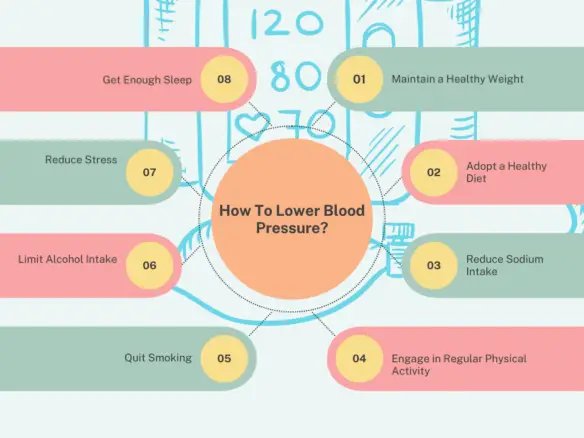Introduction:
High blood pressure or hypertension is a common medical condition that affects millions of people worldwide. It is often referred to as the “silent killer” because it has no visible symptoms and can lead to serious health problems if left untreated. Fortunately, there are several effective ways to lower blood pressure naturally. In this article, we will discuss some of the best ways to lower blood pressure.
Maintain a Healthy Weight:
Being overweight or obese can increase the risk of high blood pressure. Therefore, it is essential to maintain a healthy weight to lower blood pressure. A healthy weight is usually defined as a body mass index (BMI) between 18.5 and 24.9. You can achieve a healthy weight by eating a balanced diet and engaging in regular physical activity.
Adopt a Healthy Diet:
A healthy diet is crucial for maintaining normal blood pressure levels. A diet rich in fruits, vegetables, whole grains, and low-fat dairy products can help lower blood pressure. It is also important to limit your intake of sodium, saturated and trans fats, and added sugars. Instead, choose foods that are rich in potassium, magnesium, and calcium, such as bananas, avocados, spinach, nuts, and fish.
Reduce Sodium Intake:
Reducing your sodium intake is another effective way to lower blood pressure. Sodium is a mineral that is found in many processed foods, such as canned soups, deli meats, and fast food. Consuming too much sodium can cause your body to retain water, which can lead to high blood pressure. To reduce your sodium intake, read food labels carefully and choose foods that are low in sodium. Additionally, avoid adding salt to your food and use herbs and spices to add flavor instead.
Engage in Regular Physical Activity:
Regular physical activity can help lower blood pressure. Exercise helps strengthen the heart and blood vessels, which can improve blood flow and reduce the risk of high blood pressure. Aim for at least 30 minutes of moderate-intensity exercise most days of the week. Examples include brisk walking, cycling, swimming, and dancing.
Quit Smoking:
Smoking can damage the heart and blood vessels, leading to high blood pressure. Quitting smoking can help lower blood pressure and reduce the risk of heart disease and stroke. Talk to your healthcare provider about the best ways to quit smoking, such as nicotine replacement therapy, medications, and counseling.
Limit Alcohol Intake:
Excessive alcohol consumption can increase blood pressure. Therefore, it is important to limit your alcohol intake to moderate levels. For men, this means no more than two drinks per day, and for women, no more than one drink per day. If you have high blood pressure or other medical conditions, it is best to avoid alcohol altogether.
Reduce Stress:
Chronic stress can lead to high blood pressure. Therefore, it is essential to manage stress levels to lower blood pressure. Some effective stress-management techniques include deep breathing, meditation, yoga, and progressive muscle relaxation.
Get Enough Sleep:
Lack of sleep can increase the risk of high blood pressure. Therefore, it is important to get enough sleep to lower blood pressure. Aim for seven to eight hours of sleep per night. If you have trouble sleeping, try practicing good sleep hygiene, such as avoiding caffeine and electronic devices before bedtime, and keeping your bedroom cool, dark, and quiet.
Take Medications as Prescribed:
If lifestyle changes alone are not enough to lower your blood pressure, your healthcare provider may recommend medications. It is essential to take these medications as prescribed to lower blood pressure effectively. Do not stop taking medications without consulting your healthcare provider, even if you feel better.
Monitor Your Blood Pressure:
Regular blood pressure monitoring can help you keep track of your blood pressure levels and make necessary adjustments to your lifestyle and medications. You can measure your blood pressure at home using a blood pressure monitor or have it measured at your healthcare provider’s office.
Conclusion:
High blood pressure is a significant health concern that can lead to serious medical conditions such as heart disease and stroke. However, making simple lifestyle changes, such as maintaining a healthy weight, eating a balanced diet, engaging in regular physical activity, quitting smoking, limiting alcohol intake, managing stress, getting enough sleep, taking medications as prescribed, and monitoring blood pressure.

Leave a Reply